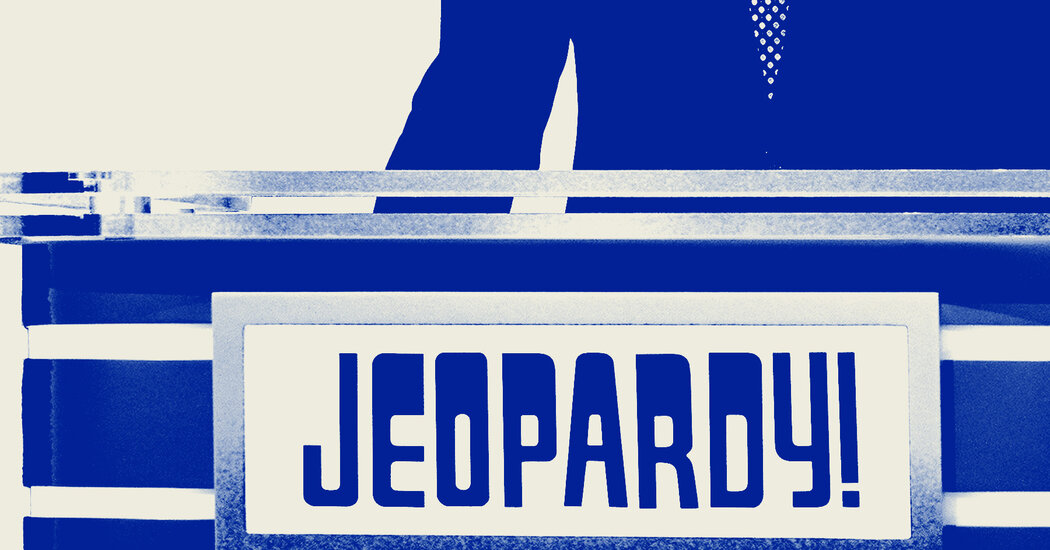Ken Jennings, the “Jeopardy!” host, doesn’t think trivia is trivial. In this episode, he makes the case that shows like “Jeopardy!” aren’t just games — they might be among the last cultural spaces where facts still matter.
Below is a transcript of an episode of “The Opinions.” We recommend listening to it in its original form for the full effect. You can do so using the player above or on the NYT Audio app, Apple, Spotify, Amazon Music, YouTube, iHeartRadio or wherever you get your podcasts.
The transcript has been lightly edited for length and clarity.
Ken Jennings: I used to say that my favorite piece of trivia was the thing about how all the calcium in your body, all the gold in your jewelry, that all formed in the heart of a star. But then I once heard Neil deGrasse Tyson being asked for his favorite fact, and that’s what he gave. So I don’t want to steal his favorite fact.
So now I say that my favorite fact is that koala fingerprints are identical to human fingerprints. It’s only relevant if you are a koala criminal, or possibly a human criminal looking to frame a koala.
My name is Ken Jennings. I’m a writer and I host the quiz show “Jeopardy!”
Audio clip from show: This is “Jeopardy!” [Applause]
Trivia to me is not trivial, and it bugs me that we call it trivia. That’s our word for unimportant things. But if you were to watch “Jeopardy!” tonight, or play pub quiz in your local bar with friends, there would be questions about nontrivial things. There would be questions about the great heroes of history, about important scientific breakthroughs, about cultural masterpieces.
Audio clip of Ken Jennings: On election night 1948, the Chicago Tribune went to press with this banner headline for the next morning’s edition. Matt?
Audio clip of “Jeopardy!” participant: Hi, Ken.
Audio clip of Ken Jennings: Hey!
Audio clip of “Jeopardy!” participant: I just wanted to say hi. What’s “Dewey Defeats Truman”?
Audio clip of Ken Jennings: That is the headline, yes!
There would also be pop lyrics and sports statistics, but all of this is important. It’s general knowledge; it’s cultural literacy. It’s the stuff that used to bring us together as a people. And I feel like in an age of disinformation, it’s more important than ever that we have this little carved-out space where knowledge matters and where facts are facts and errors are errors.
I feel like trivia can be a great social force to bring people together in a couple of ways. First of all, on a very micro level, it’s just easier to get to know someone if you share some knowledge in common. For instance, you sit next to somebody on a plane and they tell you where they’re from or the company they work for or their alma mater, or whatever it is. If you know nothing about that place or that university or that industry or that hobby, it’s a conversation killer. But if you can say, “Fargo, N.D.: I hear the fly fishing’s really good on the Red River. Isn’t Fargo on the Red River? Was Roger Maris from Fargo? Is there a museum?”
I’m a big Yankees fan. But whatever it is, that shared bit of knowledge creates connection. And then on the macro level, I think it works for a civilization, too. So many of us are siloed in our particular niches of specialized knowledge, and what we now call trivia used to be the cultural literacy that everyone shared: the songs, the historical references, the symbols, the artistic and cultural masterpieces.
These were the things that everybody used to know, and it bound us together as a people. There was a canon that defined what you could expect your neighbor to know, and I think that’s going away.
When I was a kid, my family actually moved overseas. My dad had a job in South Korea and we had no English language TV except for armed forces television. There was one channel of whatever the Department of Defense put on for our servicemen and women in Korea. So my friends and I watched the exact same shows at the exact same time every day.
And through an accident of Pentagon programming, when I got home every day after school, “Jeopardy!” was on. I was a sponge as a kid for information. I was always the kid that browsed the encyclopedia for fun, or sat in the library reading an atlas during a rainy recess. I just loved knowing stuff. But I knew that that made me weird. Even at like 7 years old, I could tell that it was against the flow of the culture to know weird stuff. But every day I would come home from school and watch “Jeopardy!”
Alex Trebek created this safe space where people who knew things were not only successful and tolerated; they were celebrated. It was really the thing that changed my life: It was watching “Jeopardy!”
“Jeopardy!” at this point is not even a TV show anymore. Really, it kind of functions as a cultural institution and almost a point of ritual in people’s daily lives. One thing I’ve heard for 20 years talking to “Jeopardy!” viewers is that they love the show so much, they plan their evening around it. So just by virtue of having been on the air for over 40 or 60 years — if you go back to Art Fleming — we’re lucky that we have this kind of vast cultural tide of good will that carries us forward.
Even though today I think “Jeopardy!” would be a hard sell as a new show. Because it’s serious stuff. It’s an arena where facts matter, where important questions have answers. To me, facts should be apolitical, and “Jeopardy!” has always been completely apolitical. It’s popular in red states and blue states alike. It’s kind of a marvel that we have this broad audience, and we’re very grateful for it.
The only thing that might make a quiz show seem political is if you’re living in an era where there’s one side of the political spectrum that benefits from depreciating knowledge, the importance of knowledge and fact itself. And I’m afraid that is happening in a lot of fields today. Government policy used to be based on settled scientific consensus in fields — just basic things, like climate is changing, or vaccines help prevent disease. This should just be base-line stuff. And now, apparently, it’s very partisan to believe either of those things.
Legal facts like birthright citizenship, or facts from the headlines like who won the 2020 election — these are not just contested things; now they are litmus tests for a certain kind of tribalism, and that’s terrible for a society. A society can’t stand with that kind of disagreement over what is true and what is error, and honestly, one great thing about quiz shows is we are a little microenvironment where these facts do have right answers and wrong answers. And they all get resolved in a matter of seconds. Someone will buzz in, and they are either right or wrong.
In an essay I wrote recently for Times Opinion, I couldn’t help but mention a recent event that had happened where Kristi Noem had been questioned by a Senate committee and had been asked if she knew what habeas corpus was and got it wrong and was told by the senator from New Hampshire: That is incorrect. And she sounded just like a quiz show host. I thought: Wouldn’t it be great if there were a little more of this kind of quiz show ethos in government, that people really would have to be told in the moment when they were wrong and have real-life consequences? I would like to see this more as an element of electoral politics.
I honestly don’t feel like “Jeopardy!” is doing anything particularly special. We’re just running a quiz show. We just want to be left alone, and I think there are many other institutions that would continue to do good work if they were just left alone. But sadly, that’s not the current environment for a lot of these institutions. The fact is this isn’t value neutral.
I was thinking about the Orwell quote about how the party wanted you to disbelieve your eyes and ears, and I think about that all the time now. Fascism has never wanted historical fact and cultural excellence to be celebrated. They don’t want people to think deeply. Authoritarianism can thrive when people are not remembering facts or pondering things deeply, and that’s why there’s a lot of distractions in the culture to try to keep us from those things. But it’s important that we try.
Thoughts? Email us at [email protected].
This episode of “The Opinions” was produced by Vishakha Darbha. It was edited by Alison Bruzek, Kaari Pitkin and Jillian Weinberger. Mixing by Carole Sabouraud. Original music by Sonia Herrero, Pat McCusker, Isaac Jones and Carole Sabouraud. Fact-checking by Mary Marge Locker. Audience strategy by Kristina Samulewski. The director of Opinion Audio is Annie-Rose Strasser.
The Times is committed to publishing a diversity of letters to the editor. We’d like to hear what you think about this or any of our articles. Here are some tips. And here’s our email: [email protected].
Follow the New York Times Opinion section on Facebook, Instagram, TikTok, Bluesky, WhatsApp and Threads.
The post ‘Jeopardy!’ Is a Reminder That Facts Are Fun — and Essential appeared first on New York Times.




